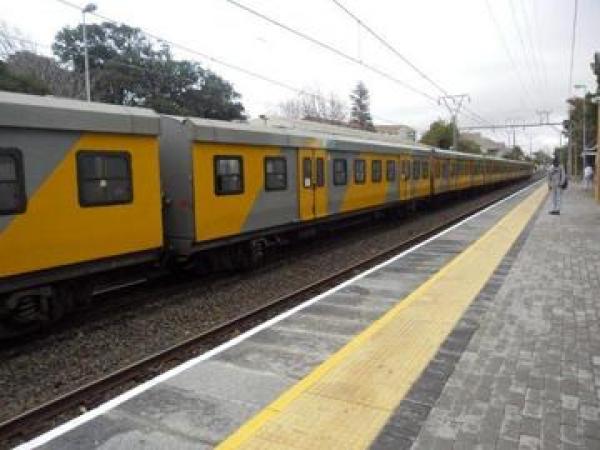

Metrorail trains have been delayed and cancelled because of infrastructural problems at the Cape Town station. Photo by Neo Sithole.
7 July 2014
“I’m stuck at the station—the train’s late” has become a catchphrase for Metrorail commuters.. But have you ever wondered exactly how often the trains are delayed, and which lines have it the worst?
Metrorail publishes a weekly newsletter called Myline that contains the train statistics from the previous week:

Screengrab from the 26 June - 2 July issue of Myline from capemetrorail.co.za
Though Myline publishes the number of trains that were on time, it does not state the total number of trains that run on each line. Furthermore, it is unclear whether this Myline data reflects all trains throughout the week and weekend, or just trains that run during peak. GroundUp asked a number of service representatives at the Cape Town station to clarify what these numbers represent, but they all replied with different answers. (One Metrorail employee from the area office asked a representative at the information desk. The representative snapped back, “If you don’t know, how should you expect me to know?”).
Finally, a representative from the Transport Information Centre checked with a Metrorail authority and said that the Myline numbers represent peak trains only.
According to an email from Metrorail spokesperson Riana Scott, peak hours are Monday through Friday, 6 to 9 am and 3 to 7pm. Her email said that during morning peak 55 trains run on the Southern Line, 70 trains run on the Northern line and 59 trains run on the Central Line. In the afternoon peak, 55 trains run on Southern, 65 trains run on Northern and 54 trains run on Central. A train is considered “on time” if it arrives within 5 minutes of its expected time.
GroundUp compiled the weekly train data from all the Myline issues published from January 2014 to June 2014 and, using the above information, generated a graph that compares the average fraction of rush-hour trains that are on time for each line. (We assumed that the number of trains on each line were mostly consistent throughout the year.)

The averages show that the trains came on-time most often on the Southern line, though the service still is not reliable. The percentages of on-time trains were similar between the Northern and Central lines, but the numbers for the Central line showed the highest standard deviation out of the three lines. This means that, on the Central line, the weekly number of on-time trains since January 2014 varied the most widely.
The Myline archives also show that, since January 2014, an average of 8.2% of Southern line trains have been cancelled during peak, while 6.2% of Northern Line trains were cancelled. Central Line trains had the greatest percentage of cancelled peak trains, with an average of 12.3%.
What the numbers do not show is the reality of Metrorail from the commuter’s perspective. When one train is late, the next train is usually overcrowded: passengers who make it inside the carriage are at risk of getting pushed out, while some commuters cling to the outside of the train to get to their destinations.
Fatima Diop, who takes a Central line train from Khayelitsha to Cape Town to get to her job at the V&A Waterfront, says that there’s a domino effect when a morning train is delayed. Many of the commuters coming off the late train must wait in the queue at the station to receive a Metrorail “late” notice. Then, there’s another long line at the taxi rank to get to work. Diop has come to expect delays as part of her work commute, and she is no longer surprised by lack of communication on the part of Metrorail: “Most of the time, if there’s a delay, they [the station announcers] don’t say anything.”